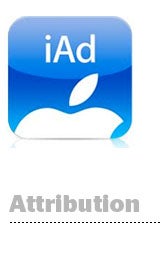 Apple has been slow to improve its offerings around mobile app installs, but it’s showing signs of life. Last week, the company issued its first clear signal that its Identifier for Advertising (IDFA) can be used as an attribution tool.
Apple has been slow to improve its offerings around mobile app installs, but it’s showing signs of life. Last week, the company issued its first clear signal that its Identifier for Advertising (IDFA) can be used as an attribution tool.
But what about its own mobile ad product, a.k.a. iAd? The company has been more active there as well, though plenty of work remains to be done if it aims to compete with the undisputed leader among mobile supply networks: Facebook.
Ten days ago, Apple began offering an attribution mechanism that app developers can use to attribute credit for app installs back to iAd impressions. It was the first time iAd had offered any way to link ads to app conversions — an acknowledgement that being able to promote your app is only useful if a mobile developer could guess which impression ultimately drove the install or post-install action. Mobile ad companies have welcomed the development.
However, Apple’s solution is far more basic than Facebook’s, offering only a binary “yes/no” indication of whether an iOS device was previously served an ad through the iAd network. By contrast, Facebook’s mobile measurement program passes a great deal more information in its attribution flag – including time stamp and campaign name.
“Sure, it’s a good start,” Apsalar CEO Michael Oiknine said of the iAd offering. But he said the “last click” attribution method still dominant in the app install world can’t be applied, and optimization is next to impossible given the lack of data.
This is a surprise when one considers Apple’s early advantage in mobile advertising. It acquired Quattro Wireless in 2010, and Facebook’s own measurement system didn’t appear until two years later.
However since then, Facebook’s early work around mobile measurement, and its huge supply volume, have created a big lead. According to eMarketer data from February 2014, Facebook captures four times more mobile display ad spend:
Oiknine says Apsalar’s own numbers suggest iAd’s share of spend is even lower than eMarketer estimates– down below 5%.
“Apple’s attribution approach… will not help them narrow the gap,” he said.
But iAd has the upper hand over Facebook in at least one area: data sharing. Advertisers can combine iAd attribution data with in-app performance data, notes Slaven Radic, CEO of TapStream. He says this gives “more color” around the total impact of mobile advertising, but it’s a no-no for Facebook mobile advertisers.
AdExchanger Daily
Get our editors’ roundup delivered to your inbox every weekday.
Daily Roundup
Facebook has long frowned on the mingling of its data with outside marketing systems, among other practices, and is serious about enforcing restrictions. In February it expelled from its measurement program two companies who were found to have violated data collection policies.
“With iAd, at least we can tell advertisers what kind of engagement they’re getting,” Radic said. “Facebook doesn’t like to share this data far downstream. You’re very limited in what you can do with it.”
Apple did not respond to a request for comment.













